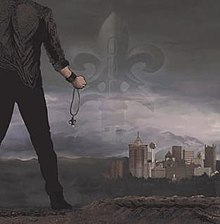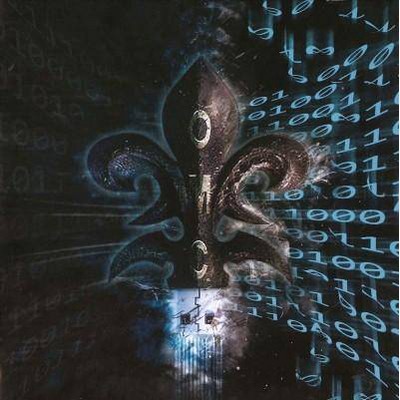This recent conversation about the
Key trilogy got me listening to it again, so I figured some reviews might be in order. Since these are concept albums that tell an interconnected story, and the music tends to serve the story more than the other way around, I’ll need to talk about both elements.
First off, these are not metal albums. They are prog rock albums, heavily influenced by the 70s and 80s prog scene, with lots of in-your-face synths and noodly bits. There are also a number of performance and production choices that are made to support the conveyance of the story, rather than what might make the tightest or best-sounding version of a specific song. For example, when the main character is scattered or woozy, so are Tate’s vocals. When the story is talking about things happening in cyberspace, the synths take the lead and the vocals may be oddly clipped or distorted to give a techy feel. For these reasons you’re not going to hear a crisp rendition of everything with the best possible technical performance, because that’s not what these albums are trying to accomplish. Whether that’s a detriment or not is in the ear of the beholder.
Regarding the story, not much is given away at first, but over the course of the trilogy you’re able to infer a number of things. The core conceit is that the main character has helped to create software that does...
something...that could either entrench power in the hands of a rich few, or fundamentally change the social order if it were given away to everyone. My interpretation is that the code allows the user to perfectly reconstruct and visualize past events (at least within recent tech-friendly times), essentially revealing anyone’s secrets and lies if the user chooses to look into their lives, or allowing them to relive their own memories if they look into their own. The software also appears to be able to suggest future outcomes, but not very accurately. Realizing this adds new context to some of the earlier songs, which was a pretty neat revelation at the time.
So, let’s get started...
Operation: Mindcrime - The Key (2015)
- Choices - An atmospheric intro suggests the birth of the software that the story revolves around. Discussions swirl around the potential implications of its use. The main character contemplates the impact of his choices in the past, present, and future, as the music crescendos. On first listen this appears to be the main character thinking about things in the present, but after completing the trilogy this may very well be the main character contemplating past events after using his software to relive them. Moody and effective. 7/10.
- Burn - The main character asks the software for suggestions on “system termination”. This might be about tearing down the social order, or might be about shutting down the software itself. A grungy groove carries us along as the main character daydreams about ending corruption and lies, burning down the existing power structure and wondering how society would restart in a world where people can’t get away with lies anymore. There are nice melodic bits under the chorus and a decent solo. 6/10.
- Re-Inventing The Future - The software is asked whether it should be given away for free or sold for profit. The music kicks in with a vibe heavily influenced by “The Mission” and “Eyes Of A Stranger”. As the main character puts the finishing touches on the software, he decides that he’s got one chance to change the world and he wants to give it away for free, no matter who may get hurt. His partners are pissed off because they stand to make a fortune, and because they’re worried about what will happen to the world if everyone can know the full truth of anything. A great dueling solo punctuates the middle of the song. Great vibe, probably the most accessible song to Queensrÿche fans. 8/10.
- Ready To Fly - A haunting melody with a playful bass line blends into a smooth, dreamy chorus. The main character has completed the code and gathers his final thoughts about the decision to release it to the world. A great synth solo plays out over a beefy rhythm line before returning for a final chorus and an odd ending. This one’s a grower, but I’d round it up to 8/10.
- Discussions In A Smoke Filled Room - The protagonist’s partners discuss their concerns about his plans. They talk about controlling him so they can still sell the code for profit, but one of them suggests killing him instead. The rest of the track is an atmospheric instrumental that’s effective, but doesn’t have a lot of substance. 7/10.
- Life Or Death? - One of the main character’s partners, who I will call Conflicted Guy, is seriously concerned about the current course of events. He wants to get rich, but he doesn’t want anyone to get hurt in the process. And yet the evil seed of an idea to kill the main character has been planted, and it seems to be taking root with the other partners. A guest vocalist sings the role of Conflicted Guy over ringing guitars, building up to a catchy chorus with synth horns. A piano-driven bridge accompanies his reluctant decision to go along with the majority’s plan, while spending the rest of the song second-guessing his choice. Another song I would round up to 8/10.
- The Stranger - A downtuned and aggressive groove accompanies Tate singing in the role of the braggadocious assassin that the partners call in to kill the main character. The vocal harmonies are a bit odd leading up to the chorus. Tate’s grunting and half-rapping here may be off-putting to some, but it lines up with the character he’s portraying. A nice atmospheric break with some ringing guitar folds back into a final run of verse and chorus. The song ends with the assassin’s phone call, wondering if the main character will “take it like a man”. This one is polarizing, but overall I like it. 7/10.
- Hearing Voices - An aggressive groove offers a promising start, but the vocals are all over the place and never find a melodic line. The chorus is just atrocious. Story-wise, the main character has been confronted by the partners and kicked out, with them keeping control of the software. The protagonist lashes out over their characterization that if he gives the code away, it will amount to “everybody watching you”. He threatens to find out everyone who was involved in pushing him out. The partner who ordered his assassination feels justified in his decision, wondering how many more people would have ended up dead if the protagonist’s plan had come to fruition. A strong solo break can’t salvage this mess. 4/10.
- On Queue - A message from the main character to Conflicted Guy claims that the code retained by the partners is encrypted and can only be unlocked and used if they have the titular encryption key. The main character describes where the key can be found, and he implores Conflicted Guy to take it and run, so the partners won’t be able to use the code. Everything now depends on him. The music is relaxed and reverberant with electronic accents, and a nice melodic break in the middle, as well as a laid back synth/sax solo. Solid stuff. 7/10.
- An Ambush Of Sadness - A brief Asian-tinged instrumental that foreshadows a melody from “The Fight” on the next album. Nice. 7/10.
- Kicking In The Door - An acoustic groove accompanies Conflicted Guy lamenting the position he’s in, knowing that the other partners will be coming for him. He has access to both the code and the encryption key, and isn’t sure if he should hand them over and get rich, stay put and resist them, or run away and help the main character. Nice melodic break. 7/10.
- The Fall - A haunting intro leads into a busy, disjointed groove. The assassin has caught up to the main character, and as the protagonist faces his end he processes the betrayal by his friends and partners, and the loss of the future he was almost able to create. The staccato verses echo his pounding heart, while the soaring chorus captures his anguish. A nice saxophone solo leads into a layered melodic break before we hear the main character’s final thought, followed by the shoveling of dirt onto his unmarked grave. Great stuff, almost excellent. A robust 8/10.
Overall:
7.0/10
A strong effort with an interesting story and a great cliffhanger at the end. There are some blemishes, most notably in “Hearing Voices”, and the production is a little muddy in places. There also aren’t any songs that really hit it out of the park (though “The Fall” comes close).
I was really into this album when it first came out, and I think it still holds up well today.





